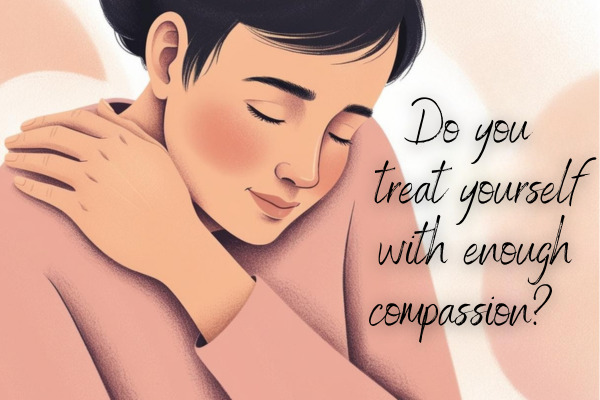Self-Compassion Is the New Self-Esteem
By Amber Jaramillo, MA, MLP and Samantha Atkins
For decades, high self-esteem was considered the holy grail of mental wellness. We were taught to believe that feeling good about ourselves was the ultimate goal—but what if that pursuit has done more harm to us than good?
Psychologist Kristin Neff, a pioneer in the field of self-compassion, suggests that when we focus on self-esteem, we are looking in the wrong direction. Her research shows that high self-esteem can sometimes backfire—leading to narcissism, bullying, and fragile self-worth that depends on always feeling “better than average,” rather than accepting ourselves as we are. She claims that the culture of focusing on self-esteem may have contributed to the Baby Boomers’ derogatory nickname: “Generation Me” (Neff, 2009).
Neff recommends that rather than spending so much time trying to boost our self-esteem, we focus instead on developing “self-compassion.” She even developed a scale that measures the concept—the Self-Compassion Scale (SCS). Today, we can all assess our levels of self-compassion online using this scale for free (Neff, 2003).
Defining Self-Compassion
Instead of building ourselves up with comparisons to others or attempting to reach our own perfectionistic standards, self-compassion offers a gentler, more sustainable way to relate to ourselves. Rooted in Buddhist philosophy and backed by Western psychology, self-compassion is the practice of treating ourselves with the same kindness, care, and understanding we would offer a friend or loved one (Neff, 2003).
According to Neff’s Self-compassion Scale, self-compassion is made up of three key elements:
- Self-kindness vs. Self-judgment—Being gentle with ourselves instead of harshly critical.
- Common humanity vs. Isolation—Recognizing that suffering and imperfection is part of being human.
- Mindfulness vs. Over-identification—Observing our thoughts and feelings without getting swept away by them.
This balanced approach to developing a healthy relationship with our self can help us feel grounded even when things go wrong, without spiraling into self-blame or denial.
Why It Matters
Neff’s research shows that people with high levels of self-compassion experience:
- Less anxiety and depression
- More happiness, optimism, and emotional resilience
- Lower risk of rumination and fear of failure
- Zero correlation with narcissism (unlike self-esteem)
In other words, self-compassion promotes mental health without the downside of inflated egos or comparison traps (Neff, 2009).
The Self-Compassion Scale (SCS)
The SCS is a 26-item questionnaire that takes about 10 minutes to complete. It’s free and available online at this link. You don’t need a license to use it, and the site even scores it for you and explains your results.
The SCS uses a Likert Scale, and responses indicate how often the activities occur; 1 meaning the action almost never occurs to 5 meaning the action almost always occurs. Sample actions include:
- “I’m disapproving and judgmental about my own flaws and inadequacies.”
- “I try to see my failings as part of the human condition.”
- “I try to be loving towards myself when I’m feeling emotional pain.”
- “When I’m feeling down, I tend to feel like most other people are probably happier than I am.”
Your score reflects your ability to treat yourself with care and understanding—even when life gets hard. Average overall scores tend to be around 3.0 on this 1-5 scale. A guide from the website says:
- 1-2.5 means you are relatively low in self-compassion and would benefit from learning to be more supportive toward yourself.
- 5-3.5 means you are moderate in self-compassion and could practice it more consistently in your life.
- 5-5 means you are relatively high in self-compassion and are often a good friend to yourself.
Who Should Use the SCS?
- Therapists can use this scale with clients—especially women—a group that statistically reports lower self-compassion and higher rates of depression (Neff, 2003).
- Educators and students may benefit, as self-compassion is linked to mastery-based learning goals (the desire to learn) rather than performance-based goals (the desire to prove ourselves).
- Parents and developmental psychologists can use the scale to explore how early relationships shape how we treat ourselves and implement interventions with young people where necessary.
- Anyone struggling with self-criticism is especially encouraged to use the SCS as it is a powerful, evidence-based tool for building emotional resilience.
A Personal Note from Amber:
As someone who’s wrestled with the rollercoaster of comparative self-esteem, discovering self-compassion felt like a breath of fresh air. I’ve taken the SCS myself and found it incredibly insightful. It helped me shift away from harsh self-judgment and toward a kinder, more grounded view of myself. I recommend it to anyone who feels stuck in a cycle of self-criticism.
Self-compassion isn’t about ignoring your flaws. It’s about recognizing that you’re human—and worthy of love, even in the midst of struggle.
References
Neff, K.D. (2003). The development and validation of a scale to measure self-compassion. Self and Identity, 2, 223-250. doi:10.1080/15298860390209035
Neff, K.D. (2009). The role of self-compassion in development: A healthier way to relate to oneself. Human Development, 52(4), 211-214. doi:10.1159/000215071



